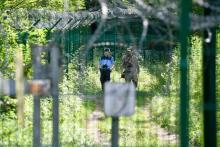All News on Social Issues in Slovenia
Tensions over solutions for posted workers
Changes entailing increased costs for employers when posting employees abroad remain a cause of tensions in Slovenia. The Finance Ministry has still not delivered on the promise to come up with solutions to mitigate the impact of the legislation, which kicks in in 2024. Criticism has also come from diplomatic circles, where salaries will be impacted too.
Inflation slows but food prices not tamed yet
Slovenia's annual inflation rate slowed to 6.1% in July, 0.8 percentage points lower than the month before, but data from the Statistics Office shows rising food prices remain a problem.
Prices of food and non-alcoholic beverages rose by 11.1% in a year, contributing 2 percentage points to the headline inflation rate, data released on 31 July shows.
Incentives instead of higher retirement age in pension reform blueprint
Slovenia does not intend to increase the retirement age to make the pension system more sustainable, instead it plans to offer incentives so that people keep working longer, but higher contributions and a new tax are also on the table, according to a Labour Ministry blueprint for pension reform released on 11 July.
Slovenia’s fertility rate drops further
Slovenia's fertility rate declined to 1.55 last year from 1.64 the year before as under 18,000 children were born, 7% less than in 2021, the latest Statistics Office data show.
The 17,627 births, or 8.4 per 1,000 population, is the fifth lowest number in the 101 years since population statistics have been available.
In Montenegro, Memories of Pain and Generosity on the Refugee Road
Dejan, then 20, had been nearing the end of his military service in Kosovo, then a southern province of Serbia, when NATO launched air strikes to halt a brutal Serbian counter-insurgency war. At the time, Serbia and Montenegro were all that was left of Yugoslavia, still joined together after the other four republics - Bosnia and Herzegovina, Croatia, Slovenia and Macedonia - had seceded.
Eurostat: Nearly 1/3 of Bulgarians are at Risk of Poverty
In 2022, 95.3 million people in the European Union were at risk of poverty or social exclusion, i.e. they lived in households with serious financial difficulties. This is according to data from the Eurostat statistical office. They remain almost unchanged from the previous year, when 95.4 million people lived at risk of poverty.
Slovenia ageing rapidly
A Eurostat projection indicates that the age structure of Slovenia's population will change significantly in the coming decades as population ageing accelerates. In 2100, the elderly are expected to account for a third of the country's population, which is forecast to decline by some 7% in the next eight decades.















